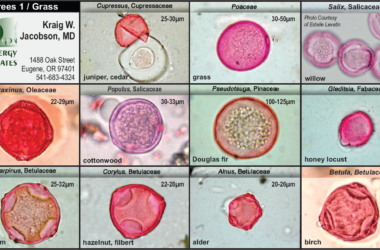
The Chronicle and PeaceHealth have partnered to help answer community members’ questions about COVID-19 vaccines, and other health issues.
I recently had the privilege of participating in Lane County Public Health’s “The Doctor is In.” Over several evenings local doctors answered questions from the community about COVID-19 vaccines. These episodes, in English and in Spanish, were hosted live on Lane County Government’s Facebook platform. I was impressed by the thoughtful questions that people submitted. Participants clearly were seeking information to make the best decisions for themselves and their families. I thought it would be helpful to share some of the questions and answers in this column:
1) Which vaccine brand is the safest?
All the vaccines available in the U.S. have proven to be extremely safe. These vaccines are the most closely monitored in the history of vaccines. Although the vaccines have some potential risks, their benefits far outweigh the risks associated with COVID-19 illness. The Johnson & Johnson vaccine does have a small risk of blood clots, mostly in women younger than 50. The risk was 7 per 1 million doses, according to the latest figures from the Centers for Disease Control and Prevention. For this reason, women in this age group may wish to consider one of the other vaccines –- Pfizer or Moderna.
The risk of anaphylaxis with any of the COVID-19 vaccines available in the U.S. is very low, even for people with a history of anaphylaxis with other vaccines.
2) I am pregnant, is it safe to get the vaccine?
It is always best to discuss this with your obstetrician or midwife. The vaccines were not studied in pregnant women during the clinical trials. However, many pregnant women have been vaccinated since the vaccines were introduced and they appear to be safe for mother and baby. In fact, there is evidence that antibodies are passed to the fetus, providing the baby with some protection against COVID-19 after birth. Additional antibodies are passed to the baby in breast milk.
3) What are the possible long-term side effects of the vaccine?
Just over a year has passed since these vaccines were developed, so there are no long-term studies. However, none of the vaccines developed earlier for other diseases have had long-term side effects. Vaccine side effects occur within the first few months of vaccination –- usually within the first few weeks. This has been true of the COVID-19 vaccines as well. Misinformation about long-term side effects is not based in science.
4) Will I likely have to get a booster COVID-19 vaccine in a year?
This is unknown at this time. Experts disagree about the likelihood because it is too early to tell. However, the best way to get this virus under control is to get vaccinated. The more quickly the virus is contained, the less likely it is to spread, change and create new variants.
5) I am young and healthy, are the complications from the vaccine worse than the potential complications for me from COVID-19?
For most young and healthy people COVID-19 is a mild illness. However, there have been young and healthy people who have become very sick and even died from this disease. Moreover, a young healthy person can spread COVID-19 to someone who is more vulnerable to becoming seriously ill. Even with the recent reports of myocarditis (inflammation of the heart) in young people after vaccination with the Pfizer or Moderna mRNA vaccines, the risks of these vaccines are very low. Individuals must make their own decisions based on their health, the health of those around them— family members and work colleagues—as well as their travel plans. The best way to stop the virus is to vaccinate as many people as possible.
6) Is there any way the mRNA type of vaccine can cause genetic disorders or infertility?
No, these vaccines do not affect a person’s DNA. The production of the antibodies occurs outside the cell nucleus, where the DNA is located. Likewise, nothing in the vaccine can cause infertility.
7) Is it true that 4,800 people in the U.S. have died from receiving the vaccine?
This statistic is based on correlation. The vaccines are being so carefully monitored that any death in a person who received the vaccine is reported. People die for many reasons. There is no evidence that the vaccine caused these deaths. Scientists are carefully analyzing the data to make sure that we capture all risks of the vaccines.
8) Can I still spread COVID-19 even if I’m vaccinated?
It is far less likely. Since vaccines are not 100% effective, people can still get COVID-19 and spread it despite being vaccinated. However, getting the vaccine dramatically reduces the risk of spreading the virus. This is why our county’s risk status has been downgraded. Thank you to all who have helped make this happen!
9) Which vaccine is the best to protect against variants?
Getting vaccinated with any of the vaccines is the best way to protect against variants. By reducing the spread of the virus in society we reduce the spread of variants.
10) How do I find reliable information about the vaccine and how it works?
There is so much information about the vaccine. Some of this information is reliable and some not. Academic institutions and medical societies are reliable sources of information. Examples include Johns Hopkins University, Mayo Clinic, American Academy of Pediatrics (healthychildren.org), and the CDC. A credible source will tell you who the author is, what their credentials are, and what research or studies support their claim. They should also be able to identify where their funding comes from.
I hope this answered some of your questions. A video of my “Doctor is in” session, as well as others, are available on the Lane County Public Health Facebook page. It is great to see the COVID-19 cases, hospitalizations and deaths go down! Vaccination is the key to keep this going.
Dr. Zuzanna Wieckowska, PeaceHealth Medical Group physician in Cottage Grove.







